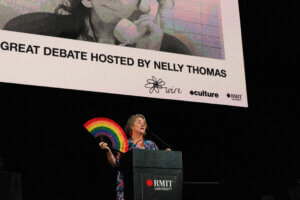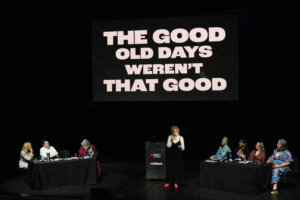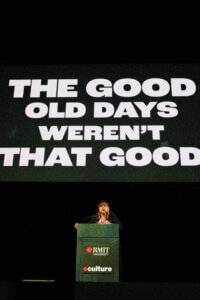WIRE radio interview on North West FM
Listen to the recording to learn more about WIRE and the services we offer to ...
Content Warning
The topics that will be discussed in this article can disclose information that can be difficult or personal. With this in mind it can be helpful to think how we can look after ourselves and each other? This can include when information is shared. How will you support yourself through this? If further support is needed a support worker from WIRE is available, you can access support in person or calling our support line on 1300 134 130.
This International Women’s Day we celebrated WIRE’s 40th birthday! Over those four decades, the team at WIRE has provided free, accessible, and accurate information on issues that matter to women, non-binary and gender diverse people. Recognising that achieving gender equity does not look or feel the same for everyone, WIRE strives for a world where all genders are given opportunity to earn, learn, and lead. To celebrate 40 years of trail-blazing social justice work, an informative yet outrageously funny debate was held at The Capitol Theatre.
In light of the UN’s 2024 International Women’s Day theme ‘Invest in Women: Accelerate Progress’ RMIT University and RMIT Culture joined forces with WIRE to host an event that reinforced the importance of economic empowerment for women and gender diverse people, and its essential role in striving towards gender equity.
The fabulous Nelly Thomas – award-winning comedian, author, and broadcaster – mediated a fierce debate addressing whether or not the ‘good old days’ were actually that good, and more importantly, who they were good for…
A panel of eight feminist experts battled it out, the affirmative team arguing that the good old days weren’t that good, and the negative team insisting they were “ripper”.

Affirmative Team:
Rana Hussain (she/her): one of the few women of colour who has excelled in sports administration. This pop-culture nerd seamlessly incorporates her unique perspective as a Muslim-Indian’ black sheep’ into her roles.
Yumi Stynes (she/her): host of podcast ‘LADIES, We Need to Talk’ and is the author of several books, including teenage advice series – Welcome to Sex, Welcome to Your Period, and Welcome to Consent.
Ro Allen (they/them): Victorian Equal Opportunity and Human Rights Commissioner with 25 years of experience in community services, governance, and social justice.
Claire Hooper (she/her): co-host of five seasons of The Great Australian Bake Off, regular guest on The Project and The Melbourne International Comedy Festival Gala, host of the podcast I’m The Worst.

Negative Team:
Geraldine Hickey (she/her): winner of the Melbourne Comedy Festival Award for Most Outstanding Show 2021, co-host on radio show Breakfasters on RRR, with multiple appearances on ABC, Triple M and the Hit Network.
Janty Blair (she/her): a proud Butchulla, Mununjali and Woppaburra woman; a Saltwater women currently based in Naarm (Melbourne), winner of the 2022 Deadly Funny final, and now writing her one-woman comedy show.
Meg Elkins (she/her): an academic and expert in behavioural economics, a senior lecturer in economics at RMIT University, with research interests in societal and cultural economics.
Chris Ryan (she/her): a former journalist and a Mum before becoming a comedian. Chris has toured Australia, and is a regular at Australian comedy clubs and festivals.
Whilst first acknowledging that the good old days may have been pleasant for some, the affirmative team quickly made their stance clear that they were no longer happy being told to “drink tea and shut up”. Lead by Rana Hussain, they skilfully combined humour, personal insight, and statistics in an attempt to convince the audience that, for women and gender diverse people, the past was really not all fun and games.
Focusing on modern, inclusive feminism, Rana captivated the audience and opposition panel with a blend of millennial wit and informative cultural references, reminding everyone that “the good old days were shit because in the good old days, no one was giving this melanin, plus size babe a mic and a platform”.
Next up was Yumi Stynes, who drew on personal experiences to reinforce that she is somewhat grateful to “be in the trenches now and not 50 years ago”. Before a theatrical exit, Yumi implored everyone to recall that the so-called ‘good’ old days saw women as property of their husbands and did not lawfully protect women from marital rape.
Ro Allen’s expertise in both legal matters and PowerPoint slides informed their argument with evidence of tangible improvement to LGBTQI+ rights. They further confirmed the presence of this representation with an entertaining reminder that the TV show Neighbours now has a rainbow family, a trans character, and even gay kissing scenes!
Closing the affirmative team’s arguments with flair was Claire Hooper, who highlighted the increasing opportunities for financial independence for women and gender diverse people in modern Australia. Recognising the ongoing work that still must be done in this field, Claire concluded with the statement “the good old days were not as good as today, and with some luck, we will be saying the same thing in the future”.
Led by Geraldine Hickey, the negative team unapologetically reminisced on ‘simpler’ times. With daunting statistics, heartfelt storytelling, and a poignant touch of comedy and sarcasm, they assured attendees that the good old days truly was the time to be alive.
Geraldine’s witty discussion opened with her satirical distain towards the multitude of career options afforded to women in modern times. Oh, how she yearns for the days where children raised themselves in the streets of suburbia and female hygiene products were considered a luxury and not a basic necessity. “If ever given the option between basic and luxury”, Geraldine said, “I will choose luxury every time”!
Next to take the stage was Janty Blair, whose incredible storytelling depicted the good old days of her Butchulla ancestors 65,000 years ago before their land was brutally stolen. Janty told stories of the Indigenous matriarchy, their sacred connection to land, and how Indigenous children were loved, cared for, and taught stories, songs, culture, and language, all whilst being considered “black, proud, strong and beautiful”. 
Meg Elkins presented thought-provoking statistics surrounding the decline of teenage girls’ mental health as a result of social media, an issue that was non-existent in the good old days. Delving into the societal impacts, Meg sparked important discussions about mental health and social media, warning everyone that social media and the smartphone are hijacking our attention, and that we really were much better off without them.
Finishing the night off with a bang, Chris Ryan contended that “the good old days were better because the ways [women and gender diverse people] have been exploited, manipulated, gaslit and devalued have gotten worse”, and whilst we may be more educated about mental health and social justice, we are certainly no happier. In order to keep up with modern expectations, one must “reduce your carbon footprint, count your steps, and check your privilege, and at the end of all that, still be grateful”. Exhausting!
In a surprising twist / Against all odds, the audience voted (with their enthusiastic cheers) in favour of the negative team, who – through comedy, storytelling, and thought-provoking facts – convinced everyone that the good old days were, indeed, far better than today.
Thank you so much to all of the incredible panellists, Nelly, the WIRE staff and volunteers, RMIT Culture and RMIT University for making the night unforgettable.